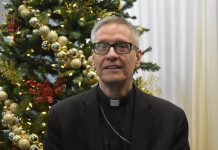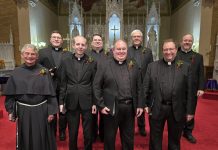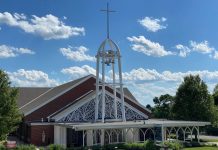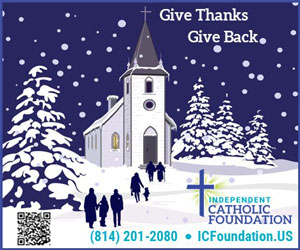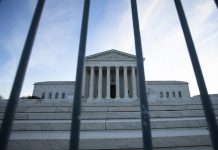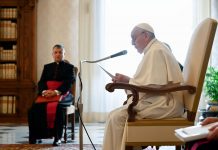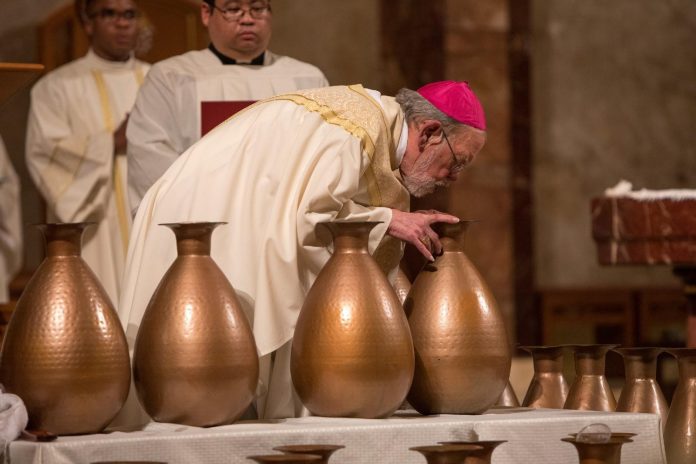
By Carol Glatz
VATICAN CITY (CNS) — As the COVID-19 pandemic nears its first full year, the Vatican Congregation for Divine Worship and the Sacraments reminded bishops that the guidelines it issued last year for celebrating the Holy Week and Easter liturgies would still be valid this year.
Local bishops still must decide the best way to celebrate this important week of the liturgical year in ways that are fruitful and beneficial to the people in their care and that respect “the safeguarding of health and what has been prescribed by the authorities responsible for the common good,” the congregation said in a note released Feb. 17.
The congregation thanked the world’s bishops and bishops’ conferences “for responding in a pastoral manner to a rapidly changing situation over the course of the year.”
“We are aware that the decisions taken have not always been easy for pastors or the lay faithful to accept,” said the note, signed by Cardinal Robert Sarah, congregation prefect, and by Archbishop Arthur Roche, secretary.
“However, we know that they were taken with a view to ensuring that the sacred mysteries be celebrated in the most effective way possible for our communities, while respecting the common good and public health,” it added.
This year, there are many countries in strict lockdown conditions, rendering it impossible for the faithful to be present in church, while in other countries, “a more normal pattern of worship is being resumed,” it said.
Because of the many different situations, the congregation said it wanted to “offer some simple guidelines in order to aid bishops in their task of judging concrete situations and providing for the spiritual welfare of pastors and faithful.”
The congregation said it recognized how much social media has helped pastors offer support and closeness to their communities during the pandemic and yet “problematic aspects were also observed.”
Nonetheless, “for the celebration of Holy Week, it is suggested that media coverage of the celebrations presided over by the bishop be facilitated and favored, encouraging the faithful who are unable to attend their own church to follow the diocesan celebrations as a sign of unity.”
Suitable aids for families and personal prayer should be prepared and encouraged, it said, also by making use of some parts of the Liturgy of the Hours.
Bishops, in conjunction with their episcopal conference, should pay attention to “some particular moments and gestures, in accordance with health care requirements,” as cited in Cardinal Sarah’s letter “Let us return to the Eucharist with joy!” published in August 2020.
That letter said that as soon as circumstances permit, the faithful need to “resume their place in the assembly” and those who have been “discouraged, frightened, absent or uninvolved for too long” need to be invited and encouraged to return.
However, necessary “attention to hygiene and safety regulations cannot lead to the sterilization of gestures and rites, to the instilling, even unconsciously, of fear and insecurity in the faithful,” the cardinal cautioned in the letter.
The note released Feb. 17 said the decree the congregation issued by papal mandate in March 2020 with guidelines for the celebration of Holy Week were also valid this year.
Suggestions in the “Decree in the Time of COVID-19” included:
— A bishop can decide to postpone the celebration of the chrism Mass since it is not formally part of the Triduum, which are the liturgies of Holy Thursday evening, Good Friday and Easter.
— Where public Masses have been canceled, bishops, in agreement with their bishops’ conference, should ensure that the Holy Week liturgies are celebrated in the cathedral and in parish churches. The faithful should be advised of the times for the celebrations, so that they can pray at home at the same time.
— Live — not recorded — televisual or internet broadcasts are helpful. The congregation also said that bishops should advise the faithful of the times for the celebrations, so that they can pray at home at the same time.
— On Holy Thursday, the Mass of the Lord’s Supper should be celebrated in the cathedral and in parish churches even without the faithful present.
— The washing of feet, which is already optional, is to be omitted when there are no faithful present and the traditional procession with the Blessed Sacrament at the end of the Mass also is omitted with the Eucharist placed directly in the tabernacle.
— For the celebration of the Easter Vigil without the faithful present, it said, the preparation and lighting of the fire is omitted, but the Easter candle is still lit, and the “Exsultet” Easter proclamation is sung or recited.
— Processions and other expressions of popular piety that are traditional around the world during Holy Week may be transferred to another date.


